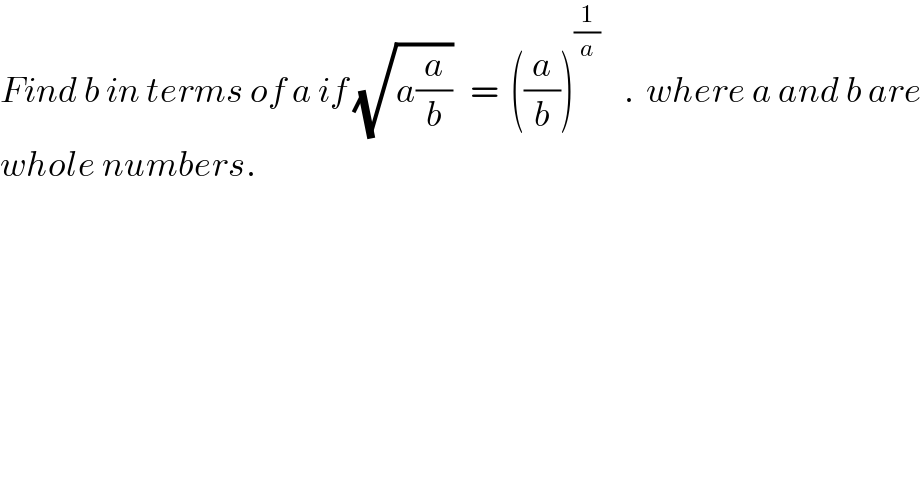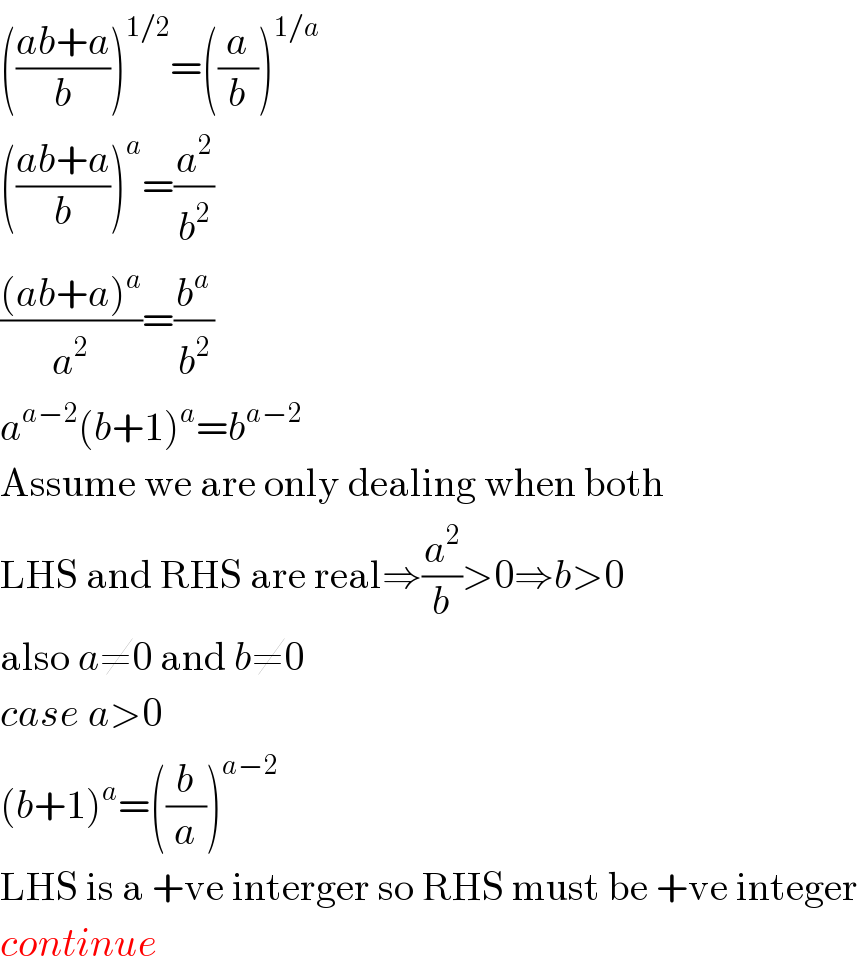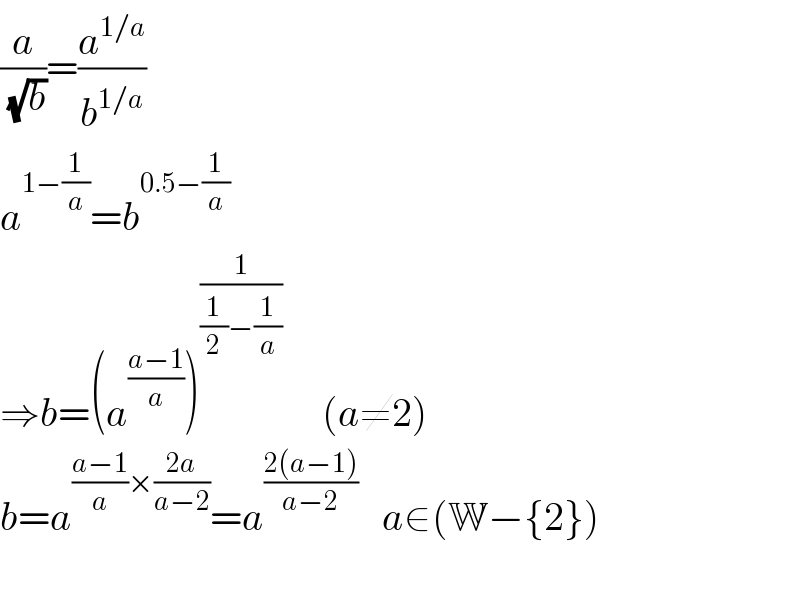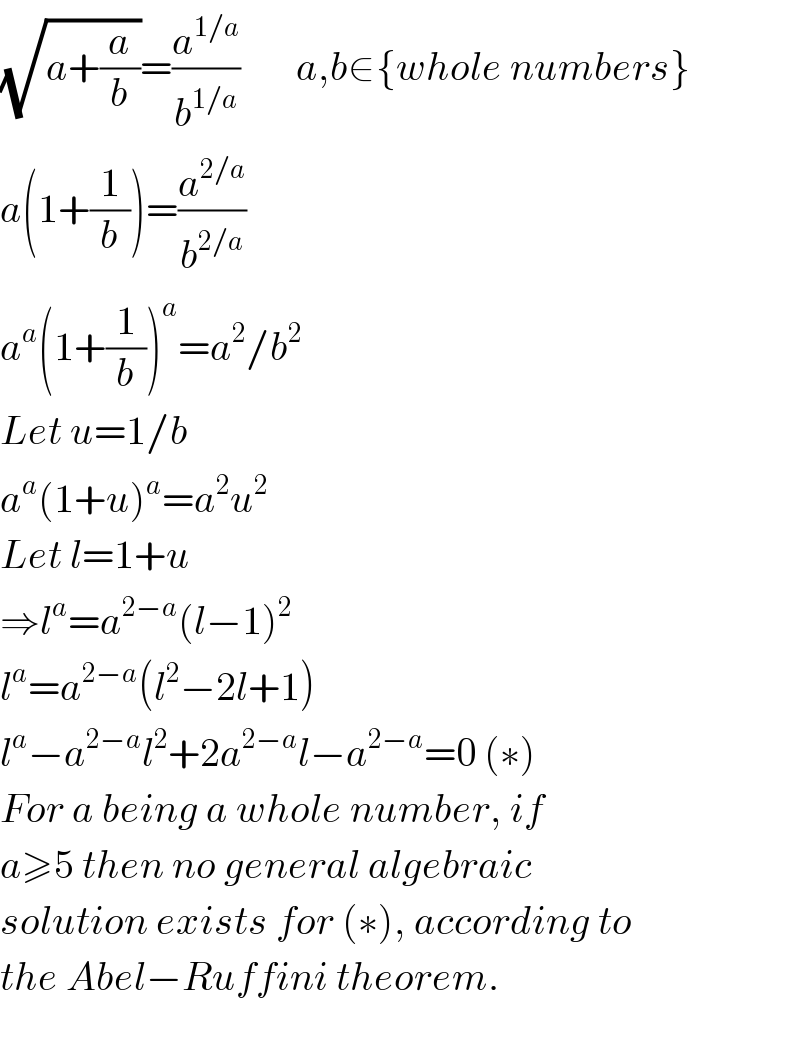
Question Number 5226 by sanusihammed last updated on 02/May/16

$${Find}\:{b}\:{in}\:{terms}\:{of}\:{a}\:{if}\:\sqrt{{a}\frac{{a}}{{b}}}\:\:\:=\:\:\left(\frac{{a}}{{b}}\right)^{\frac{\mathrm{1}}{{a}}} \:\:\:\:.\:\:{where}\:{a}\:{and}\:{b}\:{are} \\ $$$${whole}\:{numbers}.\:\: \\ $$
Commented by prakash jain last updated on 02/May/16

$$\left(\frac{{ab}+{a}}{{b}}\right)^{\mathrm{1}/\mathrm{2}} =\left(\frac{{a}}{{b}}\right)^{\mathrm{1}/{a}} \\ $$$$\left(\frac{{ab}+{a}}{{b}}\right)^{{a}} =\frac{{a}^{\mathrm{2}} }{{b}^{\mathrm{2}} } \\ $$$$\frac{\left({ab}+{a}\right)^{{a}} }{{a}^{\mathrm{2}} }=\frac{{b}^{{a}} }{{b}^{\mathrm{2}} } \\ $$$${a}^{{a}−\mathrm{2}} \left({b}+\mathrm{1}\right)^{{a}} ={b}^{{a}−\mathrm{2}} \\ $$$$\mathrm{Assume}\:\mathrm{we}\:\mathrm{are}\:\mathrm{only}\:\mathrm{dealing}\:\mathrm{when}\:\mathrm{both} \\ $$$$\mathrm{LHS}\:\mathrm{and}\:\mathrm{RHS}\:\mathrm{are}\:\mathrm{real}\Rightarrow\frac{{a}^{\mathrm{2}} }{{b}}>\mathrm{0}\Rightarrow{b}>\mathrm{0} \\ $$$$\mathrm{also}\:{a}\neq\mathrm{0}\:\mathrm{and}\:{b}\neq\mathrm{0} \\ $$$${case}\:{a}>\mathrm{0} \\ $$$$\left({b}+\mathrm{1}\right)^{{a}} =\left(\frac{{b}}{{a}}\right)^{{a}−\mathrm{2}} \\ $$$$\mathrm{LHS}\:\mathrm{is}\:\mathrm{a}\:+\mathrm{ve}\:\mathrm{interger}\:\mathrm{so}\:\mathrm{RHS}\:\mathrm{must}\:\mathrm{be}\:+\mathrm{ve}\:\mathrm{integer} \\ $$$${continue} \\ $$
Answered by Yozzii last updated on 02/May/16

$$\frac{{a}}{\sqrt{{b}}}=\frac{{a}^{\mathrm{1}/{a}} }{{b}^{\mathrm{1}/{a}} } \\ $$$${a}^{\mathrm{1}−\frac{\mathrm{1}}{{a}}} ={b}^{\mathrm{0}.\mathrm{5}−\frac{\mathrm{1}}{{a}}} \\ $$$$\Rightarrow{b}=\left({a}^{\frac{{a}−\mathrm{1}}{{a}}} \right)^{\frac{\mathrm{1}}{\frac{\mathrm{1}}{\mathrm{2}}−\frac{\mathrm{1}}{{a}}}} \:\:\:\:\:\left({a}\neq\mathrm{2}\right) \\ $$$${b}={a}^{\frac{{a}−\mathrm{1}}{{a}}×\frac{\mathrm{2}{a}}{{a}−\mathrm{2}}} ={a}^{\frac{\mathrm{2}\left({a}−\mathrm{1}\right)}{{a}−\mathrm{2}}} \:\:\:{a}\in\left(\mathbb{W}−\left\{\mathrm{2}\right\}\right) \\ $$$$ \\ $$
Commented by FilupSmith last updated on 02/May/16

$$\mathrm{What}\:\mathrm{is}\:\mathbb{W}? \\ $$
Commented by sanusihammed last updated on 02/May/16

$${Sorry}\:{it}\:{is}\:{not}\:{a}\:×\frac{{a}}{{b}}\:{it}\:{is}\:{a}\frac{{a}}{{b}}\:\:{just}\:\:\mathrm{3}\frac{\mathrm{1}}{\mathrm{3}}\:{as}\:{in}\:{mixed}\:{fraction}. \\ $$$${Thanks}\:{for}\:{your}\:{help} \\ $$
Commented by Yozzii last updated on 02/May/16

$$\mathbb{W}=\left\{{whole}\:{numbers}\right\} \\ $$
Commented by FilupSmith last updated on 02/May/16

$$\mathrm{Isn}'\mathrm{t}\:\mathrm{that}\:\mathrm{the}\:\mathrm{same}\:\mathrm{as}\:\mathbb{Z}? \\ $$
Commented by Yozzii last updated on 02/May/16

Answered by Yozzii last updated on 02/May/16

$$\sqrt{{a}+\frac{{a}}{{b}}}=\frac{{a}^{\mathrm{1}/{a}} }{{b}^{\mathrm{1}/{a}} }\:\:\:\:\:\:\:{a},{b}\in\left\{{whole}\:{numbers}\right\} \\ $$$${a}\left(\mathrm{1}+\frac{\mathrm{1}}{{b}}\right)=\frac{{a}^{\mathrm{2}/{a}} }{{b}^{\mathrm{2}/{a}} } \\ $$$${a}^{{a}} \left(\mathrm{1}+\frac{\mathrm{1}}{{b}}\right)^{{a}} ={a}^{\mathrm{2}} /{b}^{\mathrm{2}} \\ $$$${Let}\:{u}=\mathrm{1}/{b} \\ $$$${a}^{{a}} \left(\mathrm{1}+{u}\right)^{{a}} ={a}^{\mathrm{2}} {u}^{\mathrm{2}} \\ $$$${Let}\:{l}=\mathrm{1}+{u} \\ $$$$\Rightarrow{l}^{{a}} ={a}^{\mathrm{2}−{a}} \left({l}−\mathrm{1}\right)^{\mathrm{2}} \\ $$$${l}^{{a}} ={a}^{\mathrm{2}−{a}} \left({l}^{\mathrm{2}} −\mathrm{2}{l}+\mathrm{1}\right) \\ $$$${l}^{{a}} −{a}^{\mathrm{2}−{a}} {l}^{\mathrm{2}} +\mathrm{2}{a}^{\mathrm{2}−{a}} {l}−{a}^{\mathrm{2}−{a}} =\mathrm{0}\:\left(\ast\right) \\ $$$${For}\:{a}\:{being}\:{a}\:{whole}\:{number},\:{if}\: \\ $$$${a}\geqslant\mathrm{5}\:{then}\:{no}\:{general}\:{algebraic} \\ $$$${solution}\:{exists}\:{for}\:\left(\ast\right),\:{according}\:{to} \\ $$$${the}\:{Abel}−{Ruffini}\:{theorem}. \\ $$$$ \\ $$
